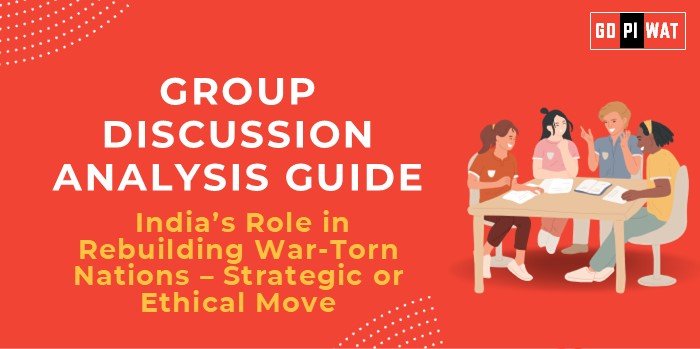📋 Group Discussion (GD) Analysis Guide: India’s Role in Rebuilding War-Torn Nations – Strategic or Ethical Move?
🌐 Introduction to the Topic
India’s active involvement in international peacekeeping and reconstruction efforts has positioned it as a significant player on the global stage. This discussion explores whether India’s actions are driven by ethical obligations or strategic interests.
Rooted in its non-aligned movement philosophy, India has contributed extensively to United Nations (UN) peacekeeping missions and post-conflict rebuilding in nations like Afghanistan, Iraq, and South Sudan. Recent reconstruction efforts in countries such as Afghanistan have intensified this debate.
📊 Quick Facts and Key Statistics
- 🕊️ UN Peacekeeping Contribution: As of April 2023, India contributed 5,875 personnel to UN peacekeeping missions, including troops, police, and experts.
- 💵 Reconstruction Aid: Nearly $3 billion invested in aid and reconstruction activities in Afghanistan until August 2021.
- 🌍 Soft Power Leadership: Recognized for cultural diplomacy and humanitarian efforts, enhancing global influence.
- 📈 Trade Considerations: Economic interests often align with aid efforts, particularly in resource-rich regions.
- 🌎 Diaspora Influence: Significant global diaspora strengthens bilateral relations and supports reconstruction initiatives.
🤝 Stakeholders and Their Roles
- 🇮🇳 Government of India: Develops and executes reconstruction policies and international aid programs.
- 🌐 Global Organizations (UN, World Bank): Coordinate financial and humanitarian support for rebuilding efforts.
- 🏗️ War-Torn Nations: Seek assistance in infrastructure development, governance, and peace stabilization.
- 🏢 Private Sector: Engages in construction, technology, and advisory roles in rebuilding projects.
- 👥 Indian Diaspora: Contributes through remittances and fostering bilateral relations.
🏆 Achievements and ⚠️ Challenges
🏆 Achievements
- 🏛️ Constructed the Afghan Parliament and Salma Dam, boosting infrastructure and governance.
- 🌍 Participated in over 49 UN peacekeeping missions, contributing more than 200,000 troops.
- 🚑 Swift response to natural disasters, like the 2015 Nepal earthquake, demonstrated regional commitment.
- 🤝 Cultural diplomacy initiatives reflect India’s ethos of “Vasudhaiva Kutumbakam” (the world is one family).
⚠️ Challenges
- 🛡️ Security risks: Attacks on Indian missions in conflict zones.
- 💰 Economic strain: Balancing domestic priorities with international commitments.
- 🌏 Geopolitical tensions: Perception of strategic motivations in aid efforts, leading to diplomatic challenges.
🌍 Global Comparisons
- 🇨🇳 China: Strategic economic control through infrastructure investments under the Belt and Road Initiative.
- 🇳🇴 Norway: Ethical diplomacy and conflict resolution without direct strategic interests.
📖 Case Studies
- 🇱🇰 Sri Lanka’s Hambantota Port: India’s efforts to counter China’s influence while aiding development.
- 🇦🇫 Afghanistan Reconstruction: India’s investments underscore its commitment to regional stability.
🗣️ Structured Arguments for Discussion
- ✅ Supporting Stance: “India’s interventions in Afghanistan and Sri Lanka have significantly uplifted infrastructure and governance, reflecting its commitment to regional stability.”
- ❌ Opposing Stance: “Aid to war-torn nations often aligns with India’s geopolitical and economic interests, overshadowing ethical considerations.”
- ⚖️ Balanced Perspective: “While strategic motives exist, India’s cultural and ethical principles undeniably guide its contributions to rebuilding efforts.”
🔍 Effective Discussion Approaches
- 📈 Statistical Start: “India has contributed 5,875 personnel to UN peacekeeping missions, reflecting its global commitment to peace.”
- 🌏 Contrast Approach: “While China focuses on strategic dominance, India’s initiatives emphasize ethical rebuilding and cultural diplomacy.”
- 🤝 Counter-Argument Handling: Highlight examples like Nepal’s reconstruction to validate India’s ethical commitment.
📊 Strategic Analysis of Strengths and Weaknesses
- 🟢 Strengths: Global reputation, robust soft power, history of successful peacekeeping missions.
- 🔴 Weaknesses: Limited financial resources, exposure to political instability in conflict zones.
- 🟡 Opportunities: Strengthen alliances, promote stability, enhance trade routes.
- 🔵 Threats: Competition from nations like China, prolonged conflicts, backlash from perceived strategic motives.
📚 Connecting with B-School Applications
- 📂 Real-World Applications: Understanding geopolitics, ethical leadership, and CSR in international business.
- 🎓 Sample Interview Questions:
- “Is India’s role in Afghanistan primarily strategic or ethical?”
- “What can India learn from Norway’s conflict-resolution model?”
- 💡 Insights for B-School Students: Explore how international aid aligns with CSR strategies and global leadership roles.


